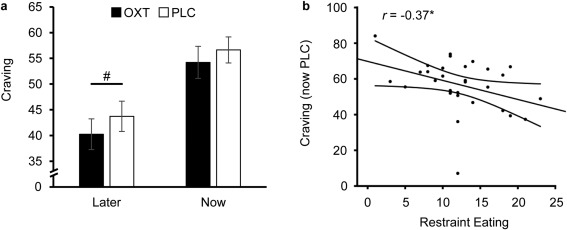Figure 1.

Oxytocin (OXT) effects on food craving ratings. Reported food craving was significantly reduced if subjects were instructed to consider the long‐term consequences of repeatedly consuming candy and desserts (LATER trials) compared to NOW trials in which the participants were instructed to consider the immediate consequences of consuming the food. The intranasal administration of OXT showed a trend to decreased craving in LATER trials (a), indicating an improved cognitive regulation of craving. Furthermore, subjects who scored higher on a questionnaire measuring a restrictive eating style displayed lower food craving ratings under PLC in the NOW trials (b). Error bars indicate the standard error of the mean (SEM). The curves next to the regression lines indicate 95% confidence intervals. Abbreviations: OXT, oxytocin; PLC, placebo; # P < 0.10.
